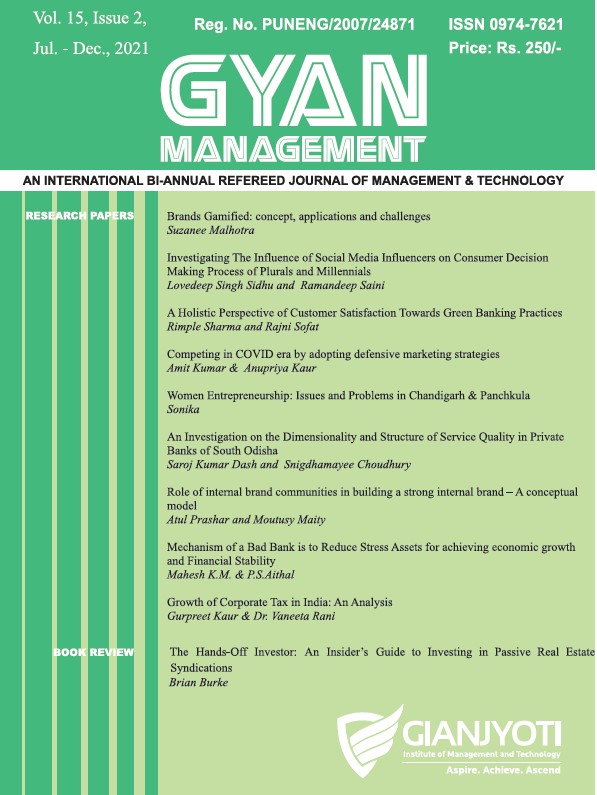Status of Women Employees and Job Satisfaction of Women Working in Corporate Sector
DOI:
https://doi.org/10.48165/gmj.2023.18.2.1Keywords:
Index ofjob Satisfaction, promotion policies, women employeesAbstract
The present paper examines the level of job satisfaction working in the corporate sector in the region of Gurgaon and Chandigarh. The major findings of the study are that women are entering the corporate sector in high numbers however their proportion is still less vis a vis their male counterparts. In the present study, majority of the women were found to be dissatisfied with their present jobs. There were many reasons for dissatisfaction among the respondents. Out of which mainly were heavy work load, long working hours, biased promotion policies and unequal pay. Further, it was observed that unseen barriers are quite prevalent in the corporate world due to which women are not able to reach at the top managerial positions. These barriers are prevalent due to the misconceptions created in respect of the ability and potential of women employees. This patriarchal mindset of the people working in corporate sector is the major hindrance in their growth and progress.
Downloads
References
Hazarika, Anjali (2017) Walk the Talk: Women, Work, Equity, Effectiveness. United States: Sage Publications. Giddens, Anthony (2009) Sociology. New Delhi: Wiley India Private Ltd.
Gjerde, K.A.P. (2002) ‘The Existence of Gender-Specific Promotion Standards in the U.S’, Managerial and Decision Economics, 23:447-459.
Gottfried, Heidi (2013) Gender, Work and Economy Unpacking the Global Economy. Maiden, USA: Polity Press.
Kulkarni, Nirzar amd Bakhare, Ruhi (2011) ‘Women Leadership in Indian Corporate: Analyzing Social Perceptions’, International journal of Multidisciplinary Research,1(4) :113-128.
Kumari, Ranjana (1998) Gender, Work and Power Relations. New Delhi: Har-Anand Publications Private Limited.
Miari, Mahmoud (1996), ‘Work Satisfaction and Gender’, International Review of Modern Sociology, 26: 67-80. Miller, J.G. and Wheeler, K.G. (1992) ‘Unraveling the Mysteries of Gender Differences in intentions to leave the organizations’, Journal of Organizational Behaviour, 13(5):465-478.
Rajesh Saundarya, Karthik and Rakesh Anju (2013), ‘Corporate Sector role in the enablement of Women’s
career in India: An empirical Study’, Standard International Journals, 5(1):101-110.
Reports and Newspapers
Census of India (2011) Work Participation Report. New Delhi:Registrar General and Census Commissioner, India.
Dikshit, Sandeep (2019, 19 April).Women on Board. The Tribune spectrum p.4.Retrieved from http://www. tribuneindia.com/news/spectrum/women-on board/68207.html
International Labour Organization (2016). Women at Work Report. Retrieved from http://www.ilo.org/ wcmsp5/groups/public/---dgreports/---dcomm/--- publ/documents/publication/wcms_457317.pdf.
Downloads
Published
Issue
Section
License
Copyright (c) 2024 Gyan Management Journal

This work is licensed under a Creative Commons Attribution 4.0 International License.



